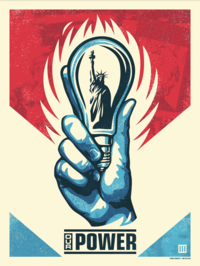On Thursday, September 12, at the Ford Foundation Center for Social Justice, Community Change, the Center on Democracy and Organizing, Demos, the Open Society Foundations, and the Ford Foundation launched a new learning series called Realizing Democracy as a part of a kickoff event.
Watch highlights from the kickoff event here:
The event featured panels and discussions focused on the limits of our current democracy, and looked to the future to see what we can do to decentralize power and make our political system more inclusive and equitable for everyone.
The speakers, moderators, performers, and presenters at the kickoff event included Lisa García-Bedolla, Denice Frohman, Maria Torres-Springer, Tom Perriello, Emma Oppenheim, Ethan Frey, Sabeel Rahman, Hahrie Han, Chuck Mingo, DaMareo Cooper, Arisha Hatch, Grace Kim, Cleo Barnett, Felicia Wong, Anat Admati, Chris Hughes, Alison Hirsh, Erica Smiley, Lauren Jacobs, Dorian Warren, Alex Hertel-Fernandez, Jamila Michener, Lorella Praeli, Helen Gym, Aziz Rana, Elizabeth Hinton, Megan Ming Francis, and Astra Taylor.
Watch Panel Videos From the Event
Watch our Panel Videos for an in-depth look at the discussions and presentations that were held live on September 12, 2019.
Civil Society
The opening panel at the launch event set the stage for our day by considering, in the context of a more racially and ethnically diverse society, whether civil society can remake itself to serve as an effective counterweight to the great concentration of wealth and power in our economic and civic life. Without pretending that the path is easy or simple, our panel presented concrete examples of how to construct civil society organizations that move from protest to power.
Economy Panel
Liberal democracy has always rested on the assumption that markets and government would work in mutually reinforcing ways. That cyclical relationship between government and the economy has been lost, but is there any hope of rebuilding it in ways that recover the foundations of moral capitalism and meet the challenges of inclusion in the 21st century? What changes to our politics, policy, and economics need to be made?
Government Panel
This panel approached the topic of government's role in the institutional failures of our crises of democratic legitimacy, extreme inequality, and market failure. What kind of policy and governmental structures are needed to govern an inclusive, multiracial society and produce more equitable outcomes? What kinds of politics will it take to shift our foundational institutions toward justice?
Closing Panel: Is Democracy on the Side of Freedom?
Dangerous levels of concentrated political and economic power underlie multiple and compounding crises—of democratic legitimacy, wealth inequality, the carceral state, racialized and gendered injustice, and a fast-warming climate. What can we learn from the intended and unintended consequences of previous expansions in the economic and political aspects of American democracy? How should we understand the limits of democratic control and frontiers of democratic expansion today? How might we remake civil society, government, and the economy if we aspire to realize a vision of democracy and justice for all, including for those never fully included in either.
